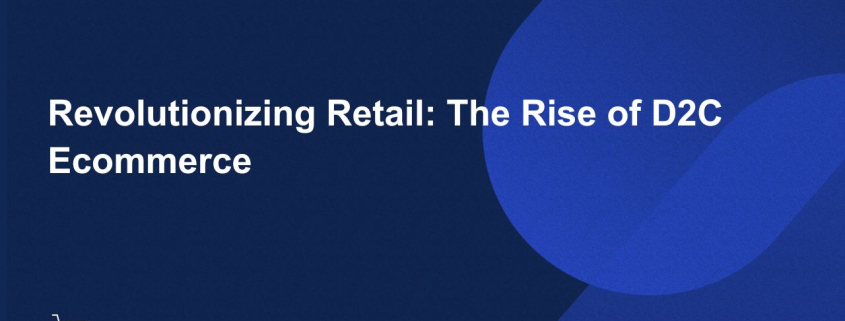Revolutionizing Retail: The Rise of D2C Ecommerce
Introduction
In a world where convenience and personalization reign supreme, direct-to-consumer (D2C) ecommerce has emerged as a game-changer for retailers. This innovative approach allows brands to forge a direct connection with consumers, eliminating the need for intermediaries such as wholesalers and retailers. By leveraging digital platforms and cutting-edge technologies, D2C ecommerce is revolutionizing retail, offering a seamless and personalized shopping experience that caters to the unique needs and preferences of individual consumers.
The Benefits of D2C Ecommerce
D2C ecommerce comes with a plethora of benefits for both retailers and consumers alike. Let’s dive into some of the key advantages this model brings to the table:
1. Cutting Out the Middleman:
By adopting a D2C approach, brands can bypass wholesalers, distributors, and retailers, allowing them to sell their products directly to consumers. This not only streamlines the supply chain but also enables brands to have full control over their pricing, branding, and customer experience.
2. Enhanced Customer Experience:
With D2C ecommerce, brands have the opportunity to build a direct and meaningful relationships with their customers. By collecting valuable data and leveraging analytics, retailers can gain insights into customer preferences, shopping habits, and demographics. Armed with this information, they can deliver highly personalized experiences, tailor-made recommendations, and targeted marketing campaigns that resonate with their audience.
3. Product Innovation and Flexibility:
D2C ecommerce empowers brands to be more agile and experimental when it comes to product development and innovation. By directly interacting with customers, brands can gather feedback, understand pain points, and iterate their products to meet the evolving needs of their target market. This flexibility enables retailers to stay ahead of the curve, adapting quickly to changing consumer demands and market trends.
4. Increased Profit Margins:
By eliminating the middleman, brands can capture a larger portion of the profit margin. Traditional retail models often involve multiple markups along the supply chain, resulting in reduced profitability for brands. D2C ecommerce enables retailers to maximize their profits by selling directly to consumers, without the need to share revenue with intermediaries.
5. Data-Driven Decision-Making:
D2C ecommerce provides retailers with valuable data insights that can drive informed decision-making. By tracking customer behavior, purchase patterns, and preferences, brands can optimize their marketing strategies, inventory management, and product assortment. Data-driven decision-making empowers retailers to make accurate forecasts, minimize risks, and enhance overall operational efficiency.
The Challenges of D2C Ecommerce
While D2C ecommerce brings numerous advantages, it is not without its challenges. Retailers embarking on this journey must be aware of the potential hurdles they may face:
1. Building Brand Awareness:
Unlike established retailers with a physical presence, D2C brands often start with limited brand recognition. Building awareness and credibility in a crowded digital landscape requires strategic marketing efforts, content creation, and social media engagement. However, by leveraging social media influencers, investing in targeted advertising, and focusing on brand storytelling, D2C brands can successfully establish themselves and gain traction.
2. Logistical Complexities:
Managing logistics and fulfillment can be a challenge for D2C brands. Unlike traditional retail models where the responsibility of warehousing, shipping, and delivery lies with the retailer or distributor, D2C brands need to handle these aspects themselves. This requires efficient inventory management, robust fulfillment processes, and partnerships with reliable logistics providers. Overcoming these logistical complexities is crucial to ensure timely and satisfactory delivery to customers.
3. Scalability and Infrastructure:
As D2C brands grow and expand their customer base, scalability becomes a critical factor. Scaling operations and infrastructure to meet increasing demand can be daunting. From website performance and server capacity to customer service capabilities, brands must invest in the right technology and infrastructure to support their growth. This may involve leveraging cloud-based solutions, implementing scalable e-commerce platforms, and establishing efficient customer support systems.
4. Competitive Landscape:
The D2C ecommerce space is highly competitive, with numerous brands vying for consumers’ attention. Standing out from the crowd and differentiating oneself can be a significant challenge. D2C brands need to craft unique value propositions, create compelling brand stories, and consistently deliver exceptional customer experiences to carve out a niche in the market. Building a loyal customer base in the face of intense competition requires continuous innovation and a deep understanding of consumer needs.
5. Customer Acquisition and Retention:
Acquiring new customers and retaining them is a perpetual challenge for D2C brands. With the proliferation of online shopping options, consumers have countless choices at their fingertips. To attract and retain customers, D2C brands must employ effective marketing strategies, leverage social media and influencer collaborations, and provide seamless and personalized experiences. By offering incentives such as loyalty programs, exclusive discounts, and exceptional customer service, brands can cultivate customer loyalty and drive repeat purchases.
The Future of D2C Ecommerce
As technology continues to advance and consumer expectations evolve, the future of D2C ecommerce looks promising. Here are some trends and developments that will shape the landscape:
1. AI and Personalization:
Artificial intelligence (AI) will play a significant role in enhancing personalization in D2C ecommerce. With AI-powered algorithms, brands can analyze customer data, predict preferences, and offer personalized recommendations. From chatbots providing real-time assistance to targeted product suggestions based on browsing history, AI will enable brands to create hyper-personalized experiences that resonate with individual customers.
2. Voice Commerce:
With the growing popularity of voice assistants such as Amazon’s Alexa and Google Assistant, voice commerce is poised to become a significant driver of D2C ecommerce. Voice-enabled shopping allows consumers to make purchases hands-free, providing convenience and ease of use. D2C brands that optimize their online presence for voice search and leverage voice-activated devices will gain a competitive edge in this emerging market.
3. Sustainability and Ethical Practices:
Increasingly, consumers are prioritizing sustainability and ethical practices when making purchasing decisions. D2C brands that align themselves with eco-friendly initiatives, transparent supply chains, and ethical manufacturing processes will attract conscientious consumers. Embracing sustainable packaging, carbon-neutral shipping, and fair trade practices can set D2C brands apart and contribute to long-term success.
4. Augmented Reality (AR) and Virtual Reality (VR):
AR and VR technologies offer immersive and interactive experiences that bridge the gap between online and offline shopping. D2C brands can leverage AR and VR to provide virtual try-on experiences, visualize products in real-world settings, and enhance the overall shopping journey. By enabling customers to make more informed purchasing decisions, these technologies can increase customer satisfaction and reduce product returns.
5. Social Commerce:
Social media platforms have become powerful channels for D2C brands to engage with consumers and drive sales. Social commerce integrates social media and online shopping, allowing customers to discover products, read reviews, and make purchases within the social media platform itself. D2C brands can leverage social commerce by optimizing their social media presence, partnering with influencers, and implementing seamless checkout experiences. This integration of social media and ecommerce will continue to shape the future of D2C retail.
FAQs
Is D2C ecommerce only for small brands and startups?
No, D2C ecommerce is not limited to small brands and startups. While it provides an excellent opportunity for emerging brands to establish themselves, even established companies are adopting the D2C model to strengthen their customer relationships, gain more control over their brand, and capture a larger share of the profit margin.
How can D2C brands compete with traditional retailers?
D2C brands can compete with traditional retailers by focusing on their unique value propositions, emphasizing personalized experiences, and leveraging digital marketing channels. By offering convenience, exceptional customer service, and innovative products, D2C brands can create a compelling alternative to traditional retail.
Are there any risks associated with D2C ecommerce?
Like any business model, D2C ecommerce has its own set of risks. These include logistical challenges, intense competition, scalability issues, and the need for robust cybersecurity measures. However, with careful planning, strategic investments, and a customer-centric approach, these risks can be mitigated.
How can D2C brands build trust with consumers?
Building trust with consumers is essential for the success of D2C brands. Transparency in pricing, shipping, and return policies, along with proactive customer support, can help establish trust. Additionally, leveraging customer reviews, testimonials, and social proof can instill confidence in potential buyers.
D2C Ecommerce Empowering Retail Industry
D2C ecommerce is reshaping the retail industry, empowering brands to forge direct connections with consumers and deliver personalized shopping experiences. By cutting out intermediaries, D2C brands gain more control over pricing, branding, and customer relationships, resulting in increased profitability and customer loyalty. While there are challenges to overcome, such as building brand awareness and managing logistics, the future of D2C ecommerce looks promising with advancements in AI, voice commerce, sustainability practices, AR/VR, and social commerce. Embracing these trends and harnessing the power of technology will enable D2C brands to thrive in a competitive digital landscape.






